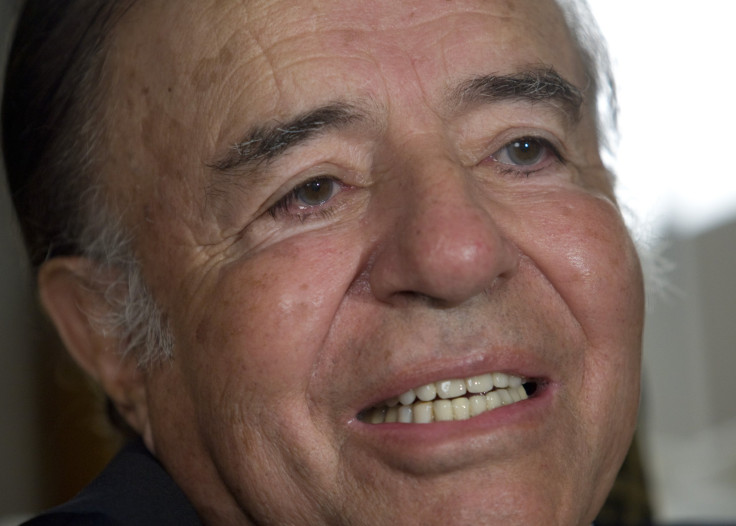Former Argentine President Convicted Of Illegal Arms Sales: Carlos Menem Part Of Country’s Large Arab Community

A court in Argentina has convicted former President Carlos Menem of illegally selling 6,500 tons of weapons to Croatia and Ecuador in the early 1990s -- in violation of existing arms embargoes at the time.
Menem’s former defense minister Oscar Camilion and 10 other officials were also found guilty.
The convictions by the appeals court overturned acquittals Menem and his co-defendants had received in 2011.
Menem, now 82 years old, held office from 1989 to 1999. He was initially charged with these crimes in October 2008.
Upon sentencing, he faces up to 12 years in prison -- although, as a current national senator for the La Rioja province, he temporarily enjoys immunity from actual incarceration. However, when his political term expires next year, he might, at the discretion of sentencing authorities, land in jail.
According to reports, during the trial, Menem said he signed documents authorizing the shipment of arms -- including rifles, anti-tank rockets and ammunition -- but insisted he believed they were headed for Panama and Venezuela, which were not subject to embargoes.
But since they ended up in Ecuador (which was engaged in a border dispute with Peru at the time) and Croatia (deeply involved in the swirling violence spreading across the Balkans in the wake of the break-up of Yugoslavia), questions of Menem’s culpability arose.
Menem, who has had a long career in Argentine politics, is an unusual figure in that he is of Middle Eastern Muslim descent (though he converted to Roman Catholicism).
In the early 20th century, his Armenian and Alawite parents immigrated to Argentina from Yabrud, a city in present-day Syria, but then a part of Turkey’s vast Ottoman Empire.
Numbering some 3.5 million today (out of a total population of about 41 million), the majority of Argentina’s Arab population hailed originally from Syria, Lebanon and Palestine.
Arabs first appeared in Argentina as early as the middle of the 19th century -- during the period between 1891 and 1920, coincident with the collapse of the Ottoman Empire, almost 370,000 people from this region moved to Argentina. They were initially classified as "Turks."
Indeed, Arabs are now the third-largest ethnic group in the country, behind Spaniards and the Italians.
Mike Konrad wrote in American Thinker, the conservative online news service, that, overall. Five percent of the Latin American population is of Arab origin, corresponding to between 25-30 million people, with Argentina having one of the highest such proportions.
“Latin American Arabs are overwhelmingly Christian; usually they are Syrian Orthodox or Roman Catholic, the older liturgical churches which blend in seamlessly in the area,” Konrad noted.
“Those who aren't have often converted to Evangelical Christianity. Islam, though found, is not so common among them.”
Konrad also noted that, like the Jews in the U.S., the Arabs in South America tend to be westernized “elites” and highly successful. Indeed, the wealthiest man in the world, Carlos Slim of Mexico, is himself of Lebanese descent.
In a study conducted by Pedro Brieger and Enrique Herszkowich of the University of Buenos Aires and published in “The Muslim World," the exact number of Arab Argentines is difficult to ascertain since many Arabs intermarried with others -- a phenomenon that ultimately reduced the numbers of Arab-origin Argentines who practiced Islam and spoke Arabic.
Aside from Menem, other prominent Arab Argentines include Mohamed Alí Seineldín, an Army colonel who engaged in two failed coups against democratic governments (including one against Menem himself); Omar Asad, an Argentine soccer player and manager; and Alan Faena, the hotelier.
© Copyright IBTimes 2024. All rights reserved.











